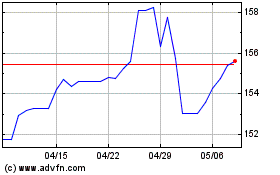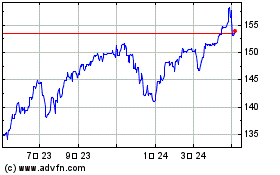UK Inflation Strengthens Call For June Rate Hike
2023年5月24日 - 6:28PM
RTTF2
UK consumer price inflation slowed less than expected in April
and the core rate accelerated unexpectedly to a 31-year high,
strengthening the case for another interest rate hike from the Bank
of England in June.
The consumer price index, or CPI, registered an annual increase
of 8.7 percent in April after a 10.1 percent gain in March, the
Office for National Statistics reported Wednesday.
Although inflation eased from April, the rate was above
economists' forecast of 8.3 percent.
Core inflation that excludes energy, food, alcoholic beverages
and tobacco advanced to 6.8 percent in April from 6.2 percent in
the previous month.
Core inflation rose to the highest since March 1992, while
economists had expected the rate to remain unchanged at 6.2
percent.
On a monthly basis, consumer prices gained 1.2 percent, which
was faster than the 0.8 percent rise in March.
"The combination of resilient activity and rapidly easing
inflation always looked a bit too good to be true to us," Capital
Economics' economist Paul Dales said.
The research firm had earlier expected that a near-term
recession would quash inflation. But it now looks as though the
central bank is going to have to hike interest rates even higher to
generate the necessary economic weakness, Dales said.
Inflation data undoubtedly makes life harder for policymakers
and no doubt raises the chance of yet another 25 basis point rate
hike next month, ING economist James Smith said.
The next monetary policy announcement is due on June 22. The BoE
had lifted its benchmark interest rate over the last twelve
straight sessions to its highest level since 2008.
In the concluding statement of the Article IV Mission of
International Monetary Fund released Tuesday, staff said the UK
economy is set to avoid a recession and that the monetary policy
will need to remain tight to keep a lid on inflation.
The Washington-based lender cautioned that inflation would
remain above the 2 percent target until mid-2025.The IMF warned
against "premature celebrations" in the fight against
inflation.
The ONS said slowdown in overall inflation was driven by
electricity and gas prices as last April's rise dropped out of the
annual comparison. Nonetheless, electricity and gas prices
contributed 1.01 percentage points to annual inflation.
At the same time, food and non-alcoholic beverages continued to
rise in April. However, the annual increase in food and
non-alcoholic beverages prices eased to 19.1 percent from 19.2
percent.
Input price inflation hit its lowest level since February 2021
and factory gate inflation reached the weakest since July 2021, the
ONS said in a separate communique.
Input prices grew only 3.9 percent in April after March's 7.3
percent increase. At the same time, month-on-month, input prices
fell 0.3 percent, reversing a 0.2 percent rise in March.
Output price inflation slowed to 5.4 percent in April from 8.5
percent in the previous month. On a monthly basis, output prices
remained flat for the second straight month.
Elsewhere, the monthly Industrial Trends survey results from the
Confederation of British Industry showed that a net 17 percent of
manufacturers said total orders declined in May compared to 20
percent in April.
US Dollar vs Yen (FX:USDJPY)
FXチャート
から 3 2024 まで 4 2024

US Dollar vs Yen (FX:USDJPY)
FXチャート
から 4 2023 まで 4 2024
